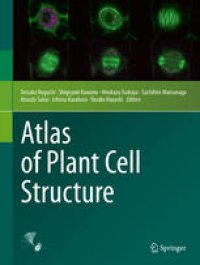
Ebook: Atlas of Plant Cell Structure
- Tags: Plant Anatomy/Development, Cell Biology, Developmental Biology, Biological Microscopy
- Year: 2014
- Publisher: Springer Japan
- Edition: 1
- Language: English
- pdf
This atlas presents beautiful photographs and 3D-reconstruction images of cellular structures in plants, algae, fungi, and related organisms taken by a variety of microscopes and visualization techniques. Much of the knowledge described here has been gathered only in the past quarter of a century and represents the frontier of research. The book is divided into nine chapters: Nuclei and Chromosomes; Mitochondria; Chloroplasts; The Endoplasmic Reticulum, Golgi Apparatuses, and Endocytic Organelles; Vacuoles and Storage Organelles; Cytoskeletons; Cell Walls; Generative Cells; and Meristems. Each chapter includes several illustrative photographs accompanied by a short text explaining the background and meaning of the image and the method by which it was obtained, with references. Readers can enjoy the visual tour within cells and will obtain new insights into plant cell structure. This atlas is recommended for plant scientists, students, their teachers, and anyone else who is curious about the extraordinary variety of living things.
This atlas presents beautiful photographs and 3D-reconstruction images of cellular structures in plants, algae, fungi, and related organisms taken by a variety of microscopes and visualization techniques. Much of the knowledge described here has been gathered only in the past quarter of a century and represents the frontier of research. The book is divided into nine chapters: Nuclei and Chromosomes; Mitochondria; Chloroplasts; The Endoplasmic Reticulum, Golgi Apparatuses, and Endocytic Organelles; Vacuoles and Storage Organelles; Cytoskeletons; Cell Walls; Generative Cells; and Meristems. Each chapter includes several illustrative photographs accompanied by a short text explaining the background and meaning of the image and the method by which it was obtained, with references. Readers can enjoy the visual tour within cells and will obtain new insights into plant cell structure. This atlas is recommended for plant scientists, students, their teachers, and anyone else who is curious about the extraordinary variety of living things.